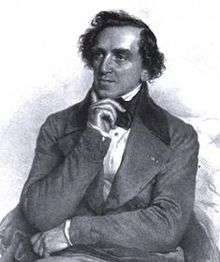L'étoile du nord
| Giacomo Meyerbeer |
|---|
 |
|
Operas
|
L'étoile du nord (The North Star) is an opéra comique in three acts by Giacomo Meyerbeer. The French-language libretto was by Eugène Scribe.
Much of the material, including some plot similarities (with the flautist Frederick the Great substituted by the flautist Peter the Great), derived from Meyerbeer's earlier 1844 Singspiel Ein Feldlager in Schlesien.[1] However, there also are some significant differences, perhaps the most important of which is that it was permissible to actually have Peter the Great take part in the action, which was not the case for Frederick, who had to play his flute off-stage. Peter does more than just take part in the action, since he ends up being the romantic lead.
A notable feature of the opera is the triple march in the finale to the second act. A rebellion against the Tsar is deflected as the "sacred march" is heard. The troops are then joined by a regiment of grenadiers from Tobolsk, to the music of a different march, followed by a regiment of Tatar cavalry to the music of a third march.
Performance history
L'étoile du nord was first performed at the Salle Favart by the company of the Opéra-Comique, Paris, on 16 February 1854. It was a big success, and soon was given in all the major theatres of Europe, North Africa, and the Americas. The Max Maretzek Italian Opera Company staged the work's United States premiere on September 24, 1856 at the Academy of Music in New York City.[2] The opera stayed in the repertory throughout most of the 19th century, but virtually disappeared by the early 20th century. However, the two big coloratura showpieces – the prayer and barcarolle in act 1 and the air with two flutes in act 3 – were still occasionally recorded by famous prima donnas such as Amelita Galli-Curci and Luisa Tetrazzini.
The work has had two revivals in recent years: one by Opera Rara in 1975, and the other at Wexford (with Elizabeth Futral as Cathérine) in 1996.
Roles
| Role | Voice type | Premiere cast, 16 February 1854 (Conductor: Théophile Tilmant) |
|---|---|---|
| Catherine, George's sister | soprano | Caroline Vandenheuvel-Duprez |
| Danilowitch, a pastry-chef | tenor | Toussaint-Eugène-Ernest Mocker |
| Ekimona | mezzo-soprano | Marguerite Decroix |
| Georges Skawronski | tenor | Pierre-Victor Jourdan |
| Gritzenko | baritone | Léonard Hermann-Léon |
| Nathalie | soprano | Marie-Charlotte Lemercier |
| Peters Michaeloff (Peter the Great) | bass | Charles-Amable Battaille |
| Prascovia, George's fiancée | soprano | Constance-Caroline Faure-Lefèbvre |
| Colonel Tchérémétoff | Charles François Duvernoy | |
| Reynolds, inn-keeper | bass | Nathan |
| General Yermoloff | baritone | Léon Carvalho |
| Ismaïloff, Cossack officer | tenor | Riquier-Delaunay |
| Soldiers, villagers, recruits, ship carpenters | ||
Recordings
Both of the recent revivals are available, the first (Opera Rara) on a privately issued CD ROM, and the second (Wexford) on a commercial CD. The first is rather significantly cut, while the second has very minimal musical omissions but greatly abridged dialogue.
- Orchestra of Philomusica, London; Opera Rara Chorus; Roderick Brydon (conductor); Malcolm King (Péters/Pierre), Janet Price (Catherine), Alexander Oliver (Danilowitz), Alan Watt (Gritzenko), Deborah Cook (Prascovia), Bonaventura Bottone (George), Lissa Gray (Nathalie), Susanna Ross (Ékimona), Graham Clark (Ismaïloff), Roger Bryson (Reynolds), Bruce Ogston (Yermolov). Recorded live 25 February 1975 at Collegiate Theater, London, as part of the Camden Festival. Unique Opera Records Corporation UORC 240 2 LPs. Also: Opera Rara CD (stereo) MRF 119-S.[3]
- Wexford Festival Opera, Vladimir Jurowski (conductor); Vladimir Ognev (Péters/Pierre), Elizabeth Futral (Catherine), Aled Hall (Danilowitz), Christopher Maltman (Gritzenko), Darina Takova (Prascovia), Juan Diego Flórez (George), Agnete Munk Rasmussen (Natalie), Patrizia Cigna (Ékimona), Robert Lee (Ismaïloff), Fernand Bernardi (Reynolds), Luis Ledesma (Yermolov). Recorded October 1997. Naxos Marco Polo 8.223829-31.
Ballet
In 1937 Constant Lambert arranged excerpts from this opera and from Le prophète into the ballet Les Patineurs, choreographed by Sir Frederick Ashton.
References
- Notes
- ↑ "L'Etoile du Nord. An Opera, in Three Acts" (1878). The Musical Times and Singing Class Circular, 19 (421): p. 160
- ↑ Vera Brodsky Lawrence (1995). Strong on Music: The New York Music Scene in the Days of George Templeton. University of Chicago Press. p. 695.
- ↑ Shaman, William; Smith, Edward Joseph; Collins, William J.; Goodwin, Calvin M. (1999). More EJS: discography of the Edward J. Smith recordings : "Unique Opera Records Corporation" (1972-1977), "A.N.N.A. Record Company" (1978-1982), "special-label" issues (circa 1954-1981), and addendum to "The Golden age of opera" series. Westport, Connecticut: Greenwood Press. ISBN 978-0-313-29835-6. Preview at Google Books.
- Sources
- Huebner, Stephen, "L'étoile du nord" in The New Grove Dictionary of Opera, ed. Stanley Sadie (London, 1992) ISBN 0-333-73432-7
- Online sources
- Casaglia, Gherardo (2005).[http://www.amadeusonline.net/almanacco?r=&alm_giorno=16&alm_mese=02&alm_anno=1854&alm_testo=L'%E9toile_du_nord "L'étoile du nord, 16 February 1854"]. Almanacco Amadeus (Italian).
External links
- L'étoile du nord: Scores at the International Music Score Library Project